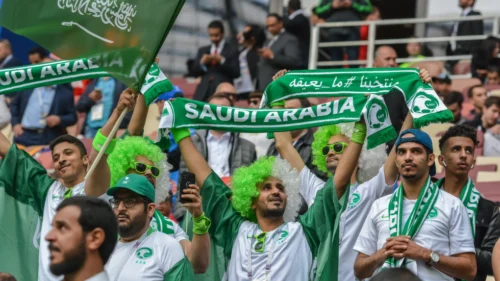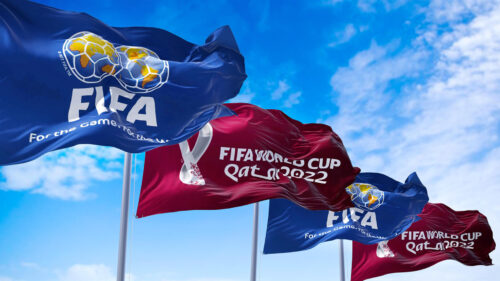World soccer body FIFA’s more than a decade-long refusal to implement meaningful reforms and adhere to its own principles, rules and regulations is on public display.
FIFA’s response to past corruption scandals and willingness to award World Cup hosting rights to violators of the group’s human rights standards illustrate the organization’s rejection of meaningful change that would hold the group accountable. So do FIFA’s repeated, mostly cosmetic, reforms aimed at pacifying public and commercial clamouring for change.
The scandals and disregard for FIFA’s Human Rights Policy and Code of Conduct are “only the tip of football’s problem iceberg. An extended troubleshooting list includes antiquated governance structures, growing financial imbalances, and inadequate safeguards for athletes, just to name some of the most pressing issues,” said law professor Jan Zglinski in a recent 26-page academic paper.
Mr. Zglinski argues that, potentially, Europe, a leader in regulating sports, and particularly soccer, as a sector of the economy, could emerge as the sport’s white knight.
Europe’s growing push for oversight
Should the EU force FIFA to reform? In doing so, Europe would deliver a body blow to FIFA and other international associations’ fictional assertion that sports and politics are separate rather than Siamese twins joined at the hip.
The European Commission would be in good company with multiple countries, including France, Spain, Poland, Mexico, South Korea and Australia, seeking to regulate aspects of soccer governance in recent years, such as transparency, gender parity, athletes’ rights and sports integrity.
Britain, one of the world’s few countries to have privatized water rather than engage in public-private partnerships that outsource the management of the essential resource, may go the furthest with parliament debating a Football Governance Bill that would create an independent regulator with powers to oversee football finance, club ownership and fan engagement. The bill would likely model the regulator on the Water Services Regulation Authority, or Ofwat, Britain’s water supervisor.
The notion of a regulator goes to the core of the elephant in the room: the inseparable relationship between politics and sports that can only be overseen by an independent body, and the adoption of a code of conduct.
While largely self-serving, international sports associations initially saw their refusal to acknowledge and police the relationship as a way of fending off government interference that would limit their autonomy.
Britain’s proposed regulator would institutionalize oversight of soccer associations but would stop short of explicitly empowering it to challenge their insistence on the fiction that sports and politics are separate.
Similarly, European debates on various ways to step up the regulation of sports associations, including FIFA, fall short of clearly addressing the elephant in the room that enables corruption, disregard of human and other rights and a lack of transparency and accountability.
Even so, various options under discussion would de facto, if not de jure, shatter the sports associations’ clinging to a fiction by imposing greater governmental scrutiny and/or regulation.
The options include greater scrutiny of FIFA and others’ conformity to EU market and competition rules, changing the nature of the European Union’s cooperation with soccer stakeholders or following Britain’s example by enacting a European Sports Act that would hold sports associations to minimum governance standards.
The standards, Mr. Zglinski suggests, could involve requirements for free, fair and regular elections, term limits for executives, representation of those stakeholders, who, at best, have a limited voice in decision-making such as women, players, clubs and fans, enhancing players’ and women’s rights and imposing adherence to adopted human rights standards, and rules to avoid conflicts of interest, possibly by separating in FIFA’s case, the group’s regulatory and commercial functions.
The myth of sports without politics
Any steps Europe may take would be applicable in the European Union only. Nevertheless, they would likely reverberate globally and strengthen critics who deplore the incestuous relationship between sports and politics, like in the case of Saudi Arabia.
Saudi Arabia has spent billions of dollars to put the kingdom on the sports map, despite its abominable human rights record, and develop sports into a sustainable sector of the economy as part of a Saudi endeavour to wean the kingdom off its dependency on oil exports.
Saudi investments and lobbying have garnered the kingdom hosting rights for multiple Asian sports tournaments as well as the 2034 World Cup. “Allowing Saudi Arabia to make all these deals is a clear indication that there is no human rights assessment,” said Abdullah Alaoudh, director for countering authoritarianism at the Middle East Democracy Center (MEDC).
Saudi Arabia has imprisoned since 2017 Mr. Aloudh’s father, Salman al-Ouda, a prominent, albeit controversial, religious scholar. FIFA’s evaluation of the Saudi World Cup bid classified the kingdom’s human rights record as a “medium” risk.
A global impact beyond Europe
Against the backdrop of a wave of European litigation challenging aspects of FIFA and European soccer body UEFA’s governance, European sports ministers last year recognized the need for EU action. The ministers called on the Commission to protect solidarity and other principles of “values-based sport,” including democracy, equality, openness, sporting merit and social responsibility.
Recent litigation has challenged the legality of FIFA rules regarding premature contract termination, restrictions on free movement and competition, the implementation of sports arbitration, the status of transnational soccer leagues and the expansion of the Club World Cup, which risks compromising players’ health.
Mr. Zglinski advocates for European legislation as the most effective means of imposing reforms and democratizing sports governance. “Even if the prospect of the EU regulating football more extensively might not seem like the perfect solution, it may well be the least imperfect solution,” Mr. Zglinski said.
“The EU has the potential to positively influence sports governance at a global scale. This is important … in light of the fact that the most powerful federations governing the game, including FIFA and UEFA, are located outside the Union. EU action can be designed so that it applies to non-EU actors, as exemplified by the Digital Services and Markets Acts, which regulate the conduct of Big Tech companies regardless of where these are based,” Mr. Zglinski added.
Like many international sports associations, FIFA and UEFA are headquartered in Switzerland.
By adopting legislation, the EU would call a halt to FIFA and other associations’ failure to protect their most vulnerable stakeholders resulting in, for example, the displacement of communities in South Africa and Brazil to make space for the 2010 and 2014 World Cups, faulty labour practices involving workers constructing World Cup facilities and the Asian Football Confederation’s refusal to honour a court’s condemnation of its disregard for a woman’s right.
“Change in sports governance rarely comes voluntarily—it requires external pressure… Football governing bodies have shown themselves to be incapable of governing the game in a democratic, fair, and socially responsive manner,” Mr. Zglinski said
“Their actions have harmed players, clubs, fans, as well as communities across the globe. Therefore, reform is imperative,” he added.
[The Turbulent World first published this piece]
[Kaitlyn Diana edited this piece]
The views expressed in this article are the author’s own and do not necessarily reflect Fair Observer’s editorial policy.
Support Fair Observer
We rely on your support for our independence, diversity and quality.
For more than 10 years, Fair Observer has been free, fair and independent. No billionaire owns us, no advertisers control us. We are a reader-supported nonprofit. Unlike many other publications, we keep our content free for readers regardless of where they live or whether they can afford to pay. We have no paywalls and no ads.
In the post-truth era of fake news, echo chambers and filter bubbles, we publish a plurality of perspectives from around the world. Anyone can publish with us, but everyone goes through a rigorous editorial process. So, you get fact-checked, well-reasoned content instead of noise.
We publish 3,000+ voices from 90+ countries. We also conduct education and training programs
on subjects ranging from digital media and journalism to writing and critical thinking. This
doesn’t come cheap. Servers, editors, trainers and web developers cost
money.
Please consider supporting us on a regular basis as a recurring donor or a
sustaining member.
Will you support FO’s journalism?
We rely on your support for our independence, diversity and quality.











Comment